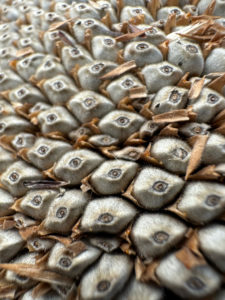
The letter below was written by OSA educational specialist Ana Galvis who leads our Organic Seed Production Course. We offer the course annually to beginning producers working on a seed farm. It is interactive, cohort-based, and designed to supplement an on-farm seed production training experience. The course includes six modules over six months, and is focused on the biological, technical, and economic aspects of organic seed production. We launched the Organic Seed Production Course in 2020 and Ana’s letter marks the graduation of the 2022 cohort. Her message is one for all of us working in seed, regardless of our connection to the course.
Dear All,
I want to start this note expressing my gratitude for the opportunity to coordinate this class and for being able to connect with all of you: Students, guest speakers, mentors, and the OSA team. All of you were very generous in sharing knowledge and experiences, that generosity created the class. I also want to apologize for any mistake made on my part, despite all my good intentions I am just a human.
I want to mention that although as an educator I have many years of experience, as a farmer I am only a beginner, and for me it was a real honor to have farmers as experienced and talented as “students”. I am also thankful for being part of the Organic Seed Alliance team, it has been a very rewarding experience.
As coordinator of this cohort, my most genuine intention was to co-create a space where we could talk about various aspects of organic seed production in a calm and safe way. I think that objective was achieved at many levels. Thank you for your support in this construction, I believe that the most important thing about these educational experiences are the connections that are generated, with all my heart I hope that ours are healthy and productive.
There’s something I’ve been thinking about that I’d like to share with all of you.
It seems that as a civilization we are at a crossroads, and it is necessary to choose, and many times the mind guided by trauma and inertia makes us believe that the choice is between Democratic candidates or Republican candidates, electric cars or gasoline cars, 1.5 Celsius degrees or 2 Celsius degrees above pre-industrial level. However, it is possible that the decision is much simpler, it is possible that the choice is between choosing life or choosing death.
To choose the most convenient option, it would be wise to define what kind of life and what kind of death we are willing to choose, and what are the consequences and costs of choosing. Answering these questions would be a titanic effort, and it is not my aim to do it in this note, but to illustrate my point I will say the following:
In my understanding, conventional agriculture, based on latifundia, chemical inputs, and mechanization, is one of the human activities (along with others such as mining, energy production, and war) that most aggressively pollutes water, air, soil, and planetary life. In my logic, all of them are extractive activities that in the long term choose death.
In contrast, true organic agriculture, based on practices that conserve water, increase organic matter in the soil, optimize the use of biodiversity, and promote more inclusive and sustainable economies, has the potential to conserve and regenerate our agroecosystems. In my logic, all of them are activities that in the short and long term choose life.
If life is what we want to choose, the choice would seem easy, but why is it so complicated? Why do elements such as the economy of scale, the global market, the consumer society, and access to labor, land and capital, seem to force us to choose different practices and logics that promote death?
I really don’t have an answer, however I hope that our work as farmers from the seed to the table will continue to give us clues about our choices.
The questions remain open: Do we want to choose life? What price are we willing to pay to choose life? Or for not choosing it?
Best wishes to all in your future endeavors as farmers and as organic seed producers. From the bottom of my heart I wish you much success and prosperity.
Best regards,
Ana Galvis
Educational Specialist, Organic Seed Alliance
